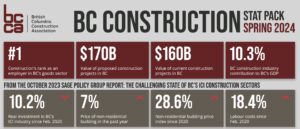
B.C. labour deficit down, but still a concern
By Adam Freill
Construction Commercial Industrial Institutional Labour ResidentialBCCA Spring 2024 reports indicate labour shortage remains, bringing higher wages and steep competition for qualified workers.
While workforce vacancy rates have declined over the past five years, it may not be enough for employers in British Columbia’s construction industry who continue to face extreme pressures, reports the British Columbia Construction Association (BCCA) in its spring 2024 B.C. Construction Industry Stat Pack and annual B.C. Construction Industry Survey Report.
According to the association’s bi-annual wages and salaries analysis, indicators are highly favourable for those considering a career in B.C.’s construction industry, but areas of concern exist for those who employ them.
Demand for construction remains high in the province, with major projects currently underway having an estimated value of $160 billion, an increase of $3B over the past six months. This represents an increase of 39 per cent over the past five years, but the estimated value of proposed major projects is sitting at just $170 billion, which is lower than in spring of last year when proposed projects were valued at $221 billion.
Labour shortages mean higher wages and steep competition for qualified workers, says BCCA, which explained that more than three-quarters of employers reported increases in wages over the past year. The average annual construction wage in the province climbed 21 per cent over the past five years, reaching $74,853. The majority of workers are full-time and year-round, and journeypersons and Red Seal tradespeople are most likely to belong to a union, says the report.
With more than 90 per cent of employers in the province’s construction sector identifying as small businesses with fewer than 20 employees, payment uncertainty and the lack of prompt payment legislation are major concerns. The majority of contractors report regularly being paid late for work completed, with a large majority (76 per cent) not having lien holdbacks released in a timely manner. Also troubling is that more than 60 per cent report at least one instance of not being paid at all for work completed in the past year.
“We have asked the Eby government time and time again to respect the hard-working people and small business owners of B.C.’s construction industry by ending payment uncertainty through prompt payment legislation,” stated BCCA president Chris Atchison. “Construction is the province’s number one goods sector employer. To see yet another legislative cycle pass without enactment of commonsense legislation already available in other Canadian jurisdictions is shocking. What’s taking so long?”
The construction industry’s skills shortage has improved significantly over the past five years in the province. While the industry still projects a deficit of 6,600 skilled workers by 2033, that is a substantial improvement from the shortfall of 26,100 estimated a decade ago.
The number of Industrial, Commercial, and Institutional (ICI) construction companies in B.C. has increased by almost 10 per cent over the past five years, bringing the tally to 28,014 enterprises, while at the same time the number of tradespeople in the industry has dropped by seven per cent in that time period, to sit at 167,300 workers. Included those trade-specific roles, 229,100 people rely directly on B.C.’s Construction industry for a paycheque.
And diversity is growing in the province. The number of women in construction trades was reported at 9,536, or 5.7 per cent of the workforce. That is an increase of more than 2,100 since the fall of 2023.
“That a majority of workers in B.C.’s construction industry confirm that they would recommend a career in construction to friends and family is an encouraging sign at a time when recruitment is desperately needed,” stated Atchison. “There is absolutely no lack of employment opportunities for anyone interested in exploring a career in construction. Today’s worksite is a much more welcoming and inclusive place than even a decade ago… Everyone, including members of traditionally underrepresented groups, should feel welcome within B.C.’s construction industry.”



